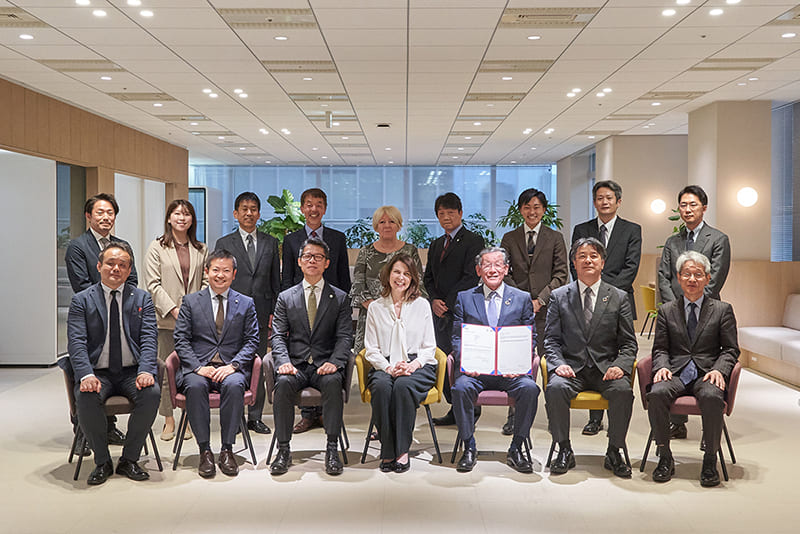October 11, 2024
NTT East and West’s road map for sustainable urban development
Contributing writer
Sustainable Japan Network

Leading telecommunications company NTT Corp. is bringing new possibilities to urban development through its Sustainable Smart City Partner Program and a tool called Sugatami. These initiatives aim to foster sustainable regional growth, address social challenges and create new value.
SSPP is a community development initiative aimed at maximizing the well-being of communities and residents. The program leverages the NTT Group’s information and communications technology expertise in collaboration with a range of partners that includes governments, companies, academic institutions and other relevant organizations. In a recent interview with The Japan Times, the general managers from NTT West and NTT East shared their experiences and insights on leveraging SSPP and Sugatami for community development initiatives.
“Sugatami, the cornerstone of SSPP, is a tool widely adopted by various communities and organizations. It is implemented through partnering businesses, such as NTT East and NTT West, to assess and visualize urban conditions,” Masato Terada, digital business director of NTT West’s business and marketing division, explained. “For NTT West, where the majority of our business is focused on municipal services, leveraging SSPP to engage with municipalities is a mission-critical objective.”
In recent years, it has not been uncommon to find municipal, prefectural and other governments facing serious demographic challenges, such as declining tax revenues from population decline and out-migration, as well as workforce shrinkage. While digitalization is urgently needed to enhance efficiency, many municipalities struggle to initiate this process. So Sugatami emerges as a powerful solution.
“We are currently initiating trials and expanding to branches across the 30 prefectures covered by the West Japan Branch. Our goal is to continuously broaden the reach of our services,” he added, discussing future prospects.
NTT East is also leveraging Sugatami to consider measures with local governments on evidence-based development. It serves as a crucial tool in this process, enabling the development of hypotheses about local issues by harnessing objective national data to assess current situations.

Yuuki Wakana, director of NTT East’s regional development department, said: “Sugatami enables us to better understand the correlation between objective indicators for urban planning metrics and subjective indicators such as resident satisfaction and happiness levels.” This enables a more comprehensive understanding of the region’s actual conditions. “We can now capture data that objective indicators alone might miss, dramatically expanding the scope and depth of our data analysis.”
Citing a specific example of Sugatami’s utility, he said: “In one area, objective indicators suggested a high-performing transportation system. However, resident satisfaction was low, primarily due to accessibility issues for the elderly and infrequent service.“
Utilizing Sugatami will facilitate the development of policies that enhance residents’ well-being. This approach will also expand its business of supporting the planning and implementation of municipal policies and measures. “Similar to NTT West, we aim to expand our municipal business in east Japan by leveraging SSPP,” Wakana explained.
A key factor in SSPP’s success in fostering innovative urban development is its advanced human resource development system, which emphasizes hands-on experience. Terada underscores the importance of this approach, stating: “Urban development isn’t something you can fully grasp from behind a desk. You need to experience it firsthand and engage with the issues on the ground to truly understand and learn. The insights gained from actually immersing oneself in the community and engaging with local government officials and residents are invaluable.”
A distinctive feature of this program is its cross-sector collaboration, bridging the gaps separating government, industry and academia. Wakana values this approach, noting: “Through hands-on field experience and collaboration with a diverse range of stakeholders — including local government officials, community financial institutions and academics from local universities — we’re developing professionals who can genuinely think from the perspective of residents and communities.” Terada also expressed optimism about SSPP’s long-term impact, stating, “As the SSPP activities continue to evolve, we anticipate the growth of peer networks among municipalities and the formation of communities of practice among local governments facing similar challenges.”
The NTT Group has high expectations for SSPP’s future growth. This initiative, bringing together an array of stakeholders stands as a potential blueprint for sustainable societal development. Its evolution and outcomes will undoubtedly be watched with great interest across Japan and beyond.
NTT is a member of the Sustainable Japan Network, a group of companies that cooperate to spread information about sustainability in Japan. You can also be part of the network; visit https://sustainable.japantimes.com/sjnetwork-en for more details.


















